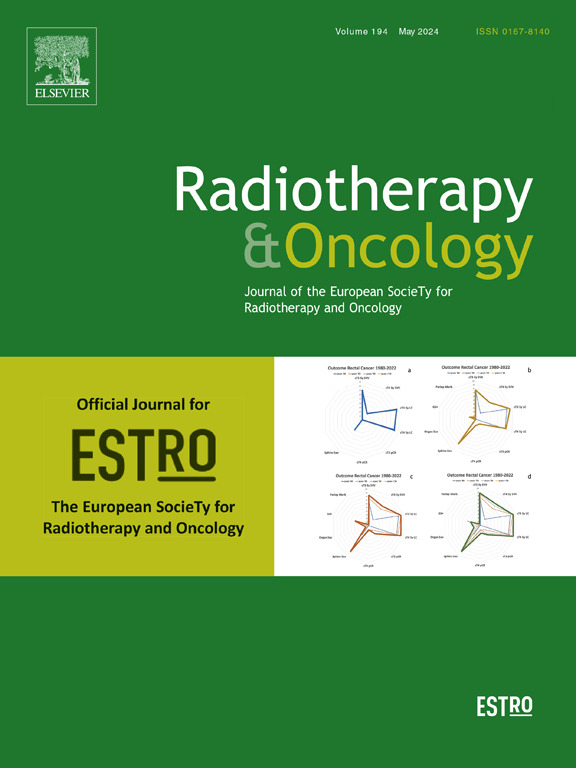成功实施放射治疗创新之路:以研究为基础的实施方案。
IF 4.9
1区 医学
Q1 ONCOLOGY
引用次数: 0
摘要
背景和目的:放射治疗(RT)正在迅速发展,但只有50% %的创新得到及时实施。尽管实施科学(ImpSci)的理论、模型和框架(tmf)是可用的,但理论与实践之间的差距仍然存在,无法有效地将这些见解应用于RT临床实践。本研究旨在利用经过验证的ImpSci知识,为RT创新开发基于共识的实施协议。材料和方法:对tmf的文献回顾(2023年5月至8月)和对荷兰RT专业人员的20次半结构化访谈(2023年8月至12月)确定了实施的关键RT组件。这些见解为RT实施方案草案提供了依据,该草案通过由11名RT专家和5名ImpSci专家参与的三轮国际Delphi研究(2024年3月至9月)进行了完善。共识采用5点李克特量表,分析中位数、四分位数范围(IQRs)和百分比评分。结果:知识到行动(KTA)框架和专家访谈的输入被用于起草协议。各轮德尔菲应答率分别为100 %、93.8 %和88.9% %。在第1轮中,88.9 %的元素达成共识(中位数 = 4.0,IQR = 0.0-1.3);在第1轮和第2轮之后,只需要修改用于及时实施的预测模型(步骤3c)。在第3轮中,同样在步骤3c中达成共识(中位数 = 4.0,IQR = 0.3)。该协议包括定义创新类型、利益相关者分析、量身定制的实施战略以及确保可持续性的分阶段评估计划。结论:这是第一个基于共识的RT创新实施方案,通过结构化的临床方法解决了理论与实践的差距。未来的研究应验证协议,并评估准备对实施成功的影响。本文章由计算机程序翻译,如有差异,请以英文原文为准。
The road to successful implementation of innovation in radiotherapy: A research-based implementation protocol
Background and purpose
Radiotherapy (RT) is rapidly advancing, yet only 50 % of innovations are implemented promptly. Despite the availability of Implementation Science (ImpSci) theories, models, and frameworks (TMFs), a theory–practice gap persists in effectively applying these insights in RT clinical practice. This study aims to develop a consensus-based implementation protocol for RT innovations using validated ImpSci knowledge.
Material and methods
A literature review of TMFs (May–August 2023) and 20 semi-structured interviews with Dutch RT professionals (August–December 2023) identified key RT components for implementation. These insights informed a draft RT implementation protocol, which was refined through a three-round international Delphi study (March–September 2024) involving 11 RT and 5 ImpSci experts. Consensus was determined using a 5-point Likert scale, analysing medians, interquartile ranges (IQRs), and percentage scoring.
Results
The Knowledge-to-Action (KTA) Framework and input from expert interviews were used to draft the protocol. Delphi response rates were 100 %, 93.8 %, and 88.9 % across rounds. In round 1, 88.9 % of elements achieved consensus (median = 4.0, IQR = 0.0–1.3); only the application of a prediction model for timely implementation (step 3c) needed revision after rounds 1 and 2. In round 3, also for step 3c consensus was reached (median = 4.0, IQR = 0.3). The protocol includes defining innovation types, stakeholder analysis, tailored implementation strategies, and a phased evaluation plan to ensure sustainability.
Conclusion
This is the first consensus-based RT innovation implementation protocol, addressing the theory–practice gap with a structured clinical approach. Future research should validate the protocol and assess the impact of preparation on implementation success.
求助全文
通过发布文献求助,成功后即可免费获取论文全文。
去求助
来源期刊

Radiotherapy and Oncology
医学-核医学
CiteScore
10.30
自引率
10.50%
发文量
2445
审稿时长
45 days
期刊介绍:
Radiotherapy and Oncology publishes papers describing original research as well as review articles. It covers areas of interest relating to radiation oncology. This includes: clinical radiotherapy, combined modality treatment, translational studies, epidemiological outcomes, imaging, dosimetry, and radiation therapy planning, experimental work in radiobiology, chemobiology, hyperthermia and tumour biology, as well as data science in radiation oncology and physics aspects relevant to oncology.Papers on more general aspects of interest to the radiation oncologist including chemotherapy, surgery and immunology are also published.
 求助内容:
求助内容: 应助结果提醒方式:
应助结果提醒方式:


